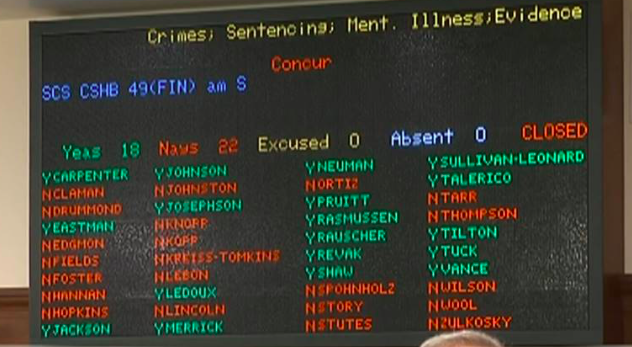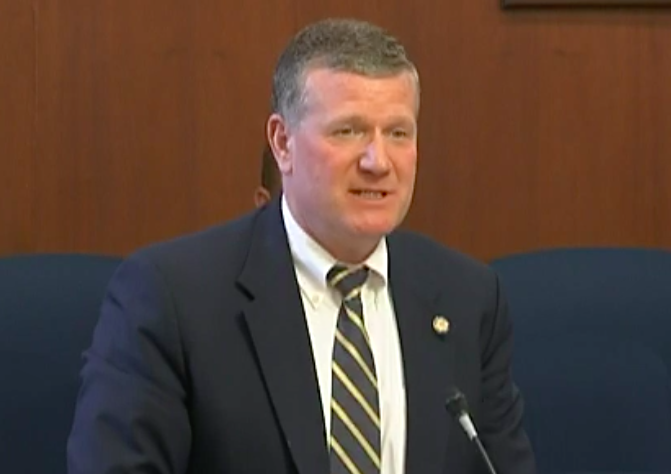Rep. Chuck Kopp, above, argues against the full repeal of SB 91 on the House floor.
SUPPORTS CRIME RESOLUTION TO PROTECT NATIVE WOMEN ONLY
All women in Alaska would have gotten greater legal protections from the Senate committee substitute for HB 49. But the Democrat-led House majority said no to the Senate changes.
Twenty-two House members were not willing to roll back SB 91 to the extent the Senate — on a vote of 20-0 — the governor, and most Alaskans want.
However, a resolution urging Congress to protect Native women did pass the House today.
And in other action in Juneau, a citation commending students for taking a stand to reduce guns in their neighborhood also passed.
HB 49 HEADS TO CONFERENCE COMMITTEE
After the Senate unanimously passed tougher crime sanctions in their version of HB 49 Tuesday, the beefed up bill returned to the House for a concurrence vote. It didn’t get concurrence from the ruling majority.
The House voted no, 22-18 almost along caucus lines. Rep. Andy Josephson and Chris Tuck voted with the Republican Minority to concur with the tougher Senate version.
A conference committee will tackle the differences between the bill’s two versions. Reps. Matt Claman, Chuck Kopp and Minority Leader Lance Pruitt will serve for the House side. The Senate conference committee members are Sens. Shelley Hughes, Mike Shower, and Bill Wielechowski.
Since the tougher version passed the Senate unanimously, there may be enough votes to preserve most parts of it, with Kopp and Claman as dissenters who will likely vote together on the conference committee.

Wednesday is the last day of the 121-day session, and the current bill is 96 pages long, with multiple differences between House and Senate.
Several House minority members spoke in favor of the Senate’s version, particularly noting the importance of protections for women who experience violence.
But the Democrat-led House Majority is eager to extend the session to give Democrats a win against one of Gov. Michael Dunleavy’s top priorities. Dunleavy promised voters he would roll back SB 91, and Claman and Kopp have worked hard to block that outcome.
“The irony of Rep. Chuck Kopp speaking about process after shoving an omnibus amendment on the Floor days prior speaks to the hypocrisy that has become the norm of this Majority,” said Rep. Lance Pruitt, House Minority leader. The Senate started working on this legislation at the beginning of session, while the House Majority waited until the final hour to try and push through a watered-down version and pass it off to Alaskans as a full repeal.”
“Last week’s conversation around crime was illuminating and enlightening for a lot of Alaskans,” said Rep. Sara Rasmussen, another Anchorage Republican who sponsored a failed amendment last week that would have ended marriage as a defense against a rape charge against a husband. “Thousands of Alaskans engaged, asking us to come into the 21st century and recognize women as equals under the law. Today, the House Majority voted again to keep marital rape legal under Alaska law.”
IRONY: HOUSE ASKS CONGRESS TO PROTECT NATIVE WOMEN
The House then went on to approve HJR 10, a joint resolution that encourages Congress to pass the Violence Against Women Act, expanding protections for Native and indigenous women in Alaska. The resolution was advocated by Rep. Tiffany Zulkosky.
The resolution passed 34-3, with Republicans David Eastman, Sarah Vance, and Ben Carpenter voting against it.
Jackson remarked on the irony of the House majority not passing major crime legislation moments earlier that could have, in fact, protected all women in Alaska from violence, and then passing a resolution asking Congress to protect just some Alaska women.
Speaker Bryce Edgmon shut Jackson down for bringing up the previous bill during her remarks. He shut down Rep. Johnson for the same reason.
Zulkosky, a hard-left member from District 38, was appointed by Gov. Bill Walker to replace Rep. Zach Fansler, who was accused of battering a date in Juneau on Jan. 13, 2018, just before legislative session began. The woman who was allegedly battered was not Native.
[Read: Sordid: A date with Rep. Zach Fansler]
Carpenter spoke to the irony of what the House was doing by passing Rep. Tiffany Zulkosky’s bill to encourage Congress to act on something the House was unable to act on — stronger laws. Then he spoke to the men of Alaska, addressing them directly:
“This is not a women’s issue, this is a man’s issue. We don’t have crime against women perpetrated by women against women. This is a man’s issue. It is the men who are not standing up. It is the men who are not doing the right thing.
“The irony is that we are going to pass an act that says Congress needs to act on our behalf to prevent violence against women,” Carpenter said. “And every day we have the opportunity to do that. As men. It’s high time we stop looking to Congress to solve this problem. It is high time for us to stand up for women in our community through our own laws. Men, it’s our responsibility.”
WHY THE HOUSE MAJORITY VOTED NO ON HB 49
The Senate version of HB 49 reinserted the tougher language of the bill that had repealed most of SB 91, the crime legislation blamed for so much of Alaska’s crime wave. HB 49 contained numerous provisions to protect Alaskans against violence, and many of those were specific to victims of sexual assault and domestic violence.
Rep. Tammie Wilson urged a no vote, as did Rep. Chuck Kopp, who has been working hand in glove with Rep. Matt Claman to pass a weaker form of criminal justice reform. Both have been defenders of SB 91, which has failed badly in the court of public opinion.
Wilson and Kopp argued today that too many changes had been made in the bill and therefore it should be decided in conference committee.
Today during the floor session, Claman raised his microphone a few times indicating he wanted to address the matter on the floor, but he was not recognized by Speaker Bryce Edgmon. Claman has been working behind the scenes to kill the stronger version of the governor’s bill that he actively opposed in House Judiciary, where he is chair.
Kopp did the majority of the speaking today to urge a no vote on the SB 91 repeal.
A CONTROVERSIAL CITATION
To add more irony to the fire, the House also passed a citation recognizing the Mountain View Keystone Club, a group of Anchorage youth that took a stand against the prevalence of guns in their community.
The House debated it extensively due to the Second Amendment issues involved, which were originally brought up by Rep. DeLena Johnson, who wanted to know if supporting the citation meant that legislators were supporting a gun ban of any sort.
What is usually a simple vote then became so emotional that Rep. Geran Tarr, the offerer of the citation, started breaking into tears as she described the violence the children in her district experience routinely and how hurt she was personally that anyone would question such a citation of children getting civically involved.
Rep. Sharon Jackson said, “I commend these children in wanting to be safe. We support these children. Don’t be misunderstood: We are standing and we will continue to stand against crime, so these kids can play in their neighborhoods. We need to deal with the bigger issue, but I would ask all of my colleagues … to approve this citation.”
Rep. Josh Revak said: “What the people in Mountain View need is criminal justice reform. We had the opportunity to do that today but we didn’t. The least we could do is send them a letter. So I’m going to vote to send them a letter.”
Rep. Kopp attempted to have him called out of order, but it was too late. Revak had already sat down.






